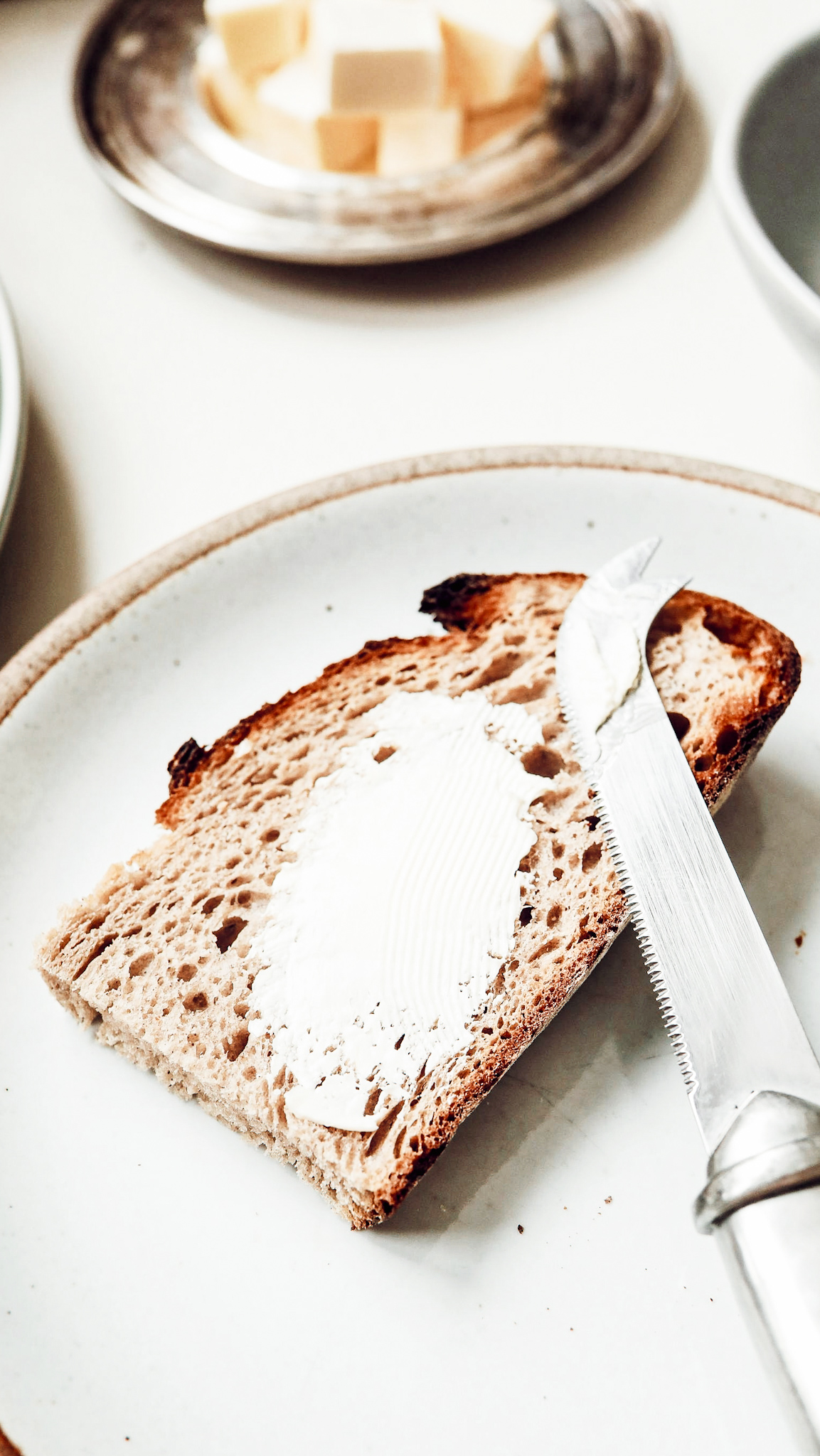Butter or Ghee for Weight Loss: Which Fat Works Better

This post may contain affiliate links, which means I may earn a small commission if you make a purchase through these links — at no extra cost to you. Thank you for supporting the content I create here on the blog! You can read my full Disclosure Policy for more details.
In this article
We’ve lived through decades of conflicting nutrition advice: “Don’t eat butter.” “Avoid fat.” “Actually, eat only fat.” No wonder the grocery aisle feels confusing. Somewhere between margarine fear-mongering and keto enthusiasm, we lost sight of what’s actually good for us.
Now, the spotlight is back on natural fats — and butter and ghee are having a moment. Both are rich, satisfying, and—depending on who you ask—either a superfood or a diet disaster. But when it comes to weight loss, which one actually helps you feel better, burn fat, and keep it off?
Let’s talk about what these fats really do in your body.
Butter vs. Ghee: Same Family, Different Personalities
Butter and ghee might look like siblings, but they’re more like cousins who grew up in different households.
Butter is made by churning cream until the fat separates from the buttermilk. It’s creamy, slightly salty, and contains small amounts of milk solids (proteins and sugars like lactose).
Ghee, on the other hand, is butter that’s been simmered down—water and milk solids removed—until you’re left with pure golden fat. It has a nutty aroma, a longer shelf life, and a higher smoke point (meaning you can cook with it without burning).
In essence: butter is the classic; ghee is butter’s refined, minimalist upgrade.
Why Fats Aren’t the Enemy (Anymore)
If you grew up during the “fat-free” craze of the ’90s or early 2000s, you might still feel a little nervous about full-fat anything. But science has come a long way since then.
Here’s the short version: fat doesn’t make you fat. In fact, the right types of fat can actually help your body burn fat.
Healthy fats—like the kind found in butter and ghee—do three important things for weight management:
- They keep you full longer.
Fat slows down digestion and triggers satiety hormones like leptin, so you’re less likely to snack an hour after eating. - They stabilize blood sugar.
Adding fat to meals can blunt the sugar spike that often leads to energy crashes and cravings later. - They fuel fat burning.
When carbs are limited, your body switches to using fat (including stored fat) for energy—a process known as ketosis.
So instead of thinking of butter or ghee as “off-limits,” it’s worth asking: How can I use these fats strategically to feel more energized and satisfied?
The Nutrition Breakdown
| Nutrient (per tbsp) | Butter | Ghee |
|---|---|---|
| Calories | ~100 | ~120 |
| Total Fat | 11g | 13g |
| Saturated Fat | 7g | 9g |
| Lactose | Yes | No |
| Smoke Point | 350°F | 480°F |
| Vitamins | A, D, E, K | A, D, E, K (more concentrated) |
Ghee is pure fat—no milk solids, no lactose, no casein—so it’s easier to digest and ideal for anyone who’s sensitive to dairy. Butter, meanwhile, still contains small amounts of protein and sugar, which can cause bloating in some people.
Butter’s Superpower: Gut Health and Natural Fat Burners
Butter gets a bad rap, but high-quality, grass-fed butter actually contains some surprising nutrients that support weight loss and overall health.
- Butyrate, a short-chain fatty acid found in butter, feeds the cells lining your gut. A healthy gut means better metabolism, improved digestion, and less inflammation.
- CLA (Conjugated Linoleic Acid) is another fat in butter that’s been shown in studies to help reduce body fat and increase lean muscle mass.
- Plus, butter contains fat-soluble vitamins like A, D, E, and K2, all crucial for hormone balance, thyroid function, and energy production.
If you’ve ever switched from margarine to real butter and noticed you feel fuller and more satisfied, that’s not your imagination—it’s biology.
Ghee’s Glow-Up: Purity, Digestion, and Metabolic Magic
If butter is the classic, ghee is the upgrade. Because it’s free from milk solids, it’s less likely to cause inflammation or digestive discomfort.
In Ayurvedic tradition, ghee has long been considered liquid gold—a food that supports digestion, hormone balance, and vitality. Modern science actually backs some of this up:
- Ghee is rich in butyrate (yes, even more than butter), which supports gut health and fat metabolism.
- It contains omega-3 and omega-9 fatty acids, which help reduce inflammation and support brain function.
- Its high smoke point makes it ideal for cooking without creating harmful free radicals (something that happens when vegetable oils are overheated).
In other words: ghee helps your body burn clean, digest efficiently, and thrive.
So… Which One Is Better for Weight Loss?
Here’s the honest answer: both butter and ghee can fit into a healthy, weight-conscious lifestyle—it just depends on your body and your goals.
- If you’re lactose intolerant, ghee is your go-to.
- If you love that creamy, rich taste and tolerate dairy well, grass-fed butter is perfectly fine.
- If you cook often at high heat (stir-frying, roasting), ghee is more stable and won’t oxidize.
- And if you’re following a Keto or low-carb plan, ghee’s pure fat composition gives it a slight advantage for staying in fat-burning mode.
Think of it this way: butter is comforting; ghee is functional. You don’t have to pick one forever—you can use both, depending on what your body needs.
How to Use Butter or Ghee to Support Fat Loss
Here’s where the lifestyle magic happens. It’s not about pouring ghee on everything or eating butter by the spoonful. The key is balance and timing.
Try this:
- Morning: Add a teaspoon of ghee or butter to your coffee or matcha (a.k.a. bulletproof coffee). It keeps you full and focused for hours.
- Cooking: Use ghee for roasting vegetables or searing proteins—it holds up beautifully under heat.
- Finishing touch: Melt a small pat of butter over steamed greens or rice for flavor and nutrient absorption.
- Post-workout: Pair a healthy fat with protein and carbs for muscle recovery and stable blood sugar.
Just remember: fats are calorie-dense. A little goes a long way.
Quality Over Quantity (Always)
Not all butter or ghee is created equal. Look for:
- Grass-fed or pasture-raised sources — richer in omega-3s, CLA, and vitamins.
- Organic options — fewer additives and better nutrient profiles.
- Minimal processing — avoid clarified butters with added flavors or preservatives.
Brands like Kerrygold (for butter) and Ancient Organics or Fourth & Heart (for ghee) are solid, clean options. You can even make ghee at home by slowly heating unsalted butter until the milk solids settle and the fat turns golden.
Common Mistakes to Avoid
Even healthy fats can work against you if you overdo them. A few to watch for:
- Using too much: One tablespoon of fat equals 100–120 calories. That adds up fast.
- Mixing with refined carbs: Buttered toast or ghee-topped pancakes taste amazing, but the combo of fat and refined carbs can spike insulin and store more fat.
- Skipping other nutrients: Healthy fats should complement a diet rich in veggies, protein, and fiber—not replace them.
- Choosing poor quality: Avoid heavily processed or non-grass-fed options—they lack the nutrients that make butter and ghee beneficial in the first place.
The Bottom Line: Fat Is Your Friend (When You Treat It Like One)
Both butter and ghee are nutrient-dense, satisfying, and yes—compatible with weight loss. The trick is mindful use and quality sourcing.
Butter brings CLA and butyrate, supporting metabolism and gut health.
Ghee takes it a step further with purity, digestibility, and heat stability.
If you’ve spent years fearing fat, this is your permission to rethink that story. When used intentionally—alongside a colorful, whole-food diet—these fats can help you feel fuller, think clearer, and love your food again.
So whether you’re Team Butter or Team Ghee, the goal is the same: eat real food, listen to your body, and trust that nourishment can taste really, really good.
FAQs About Butter or Ghee for Weight Loss
Is ghee better than butter for weight loss?
Yes, for many people, ghee is slightly better for weight loss because it’s pure fat, lactose-free, and easier to digest. It also contains more short-chain fatty acids and butyrate, which support metabolism and gut health. That said, both can fit into a healthy diet when used in moderation.
Can I eat butter or ghee every day while trying to lose weight?
Absolutely — as long as you control portion sizes. One to two teaspoons a day can boost satiety and help your body absorb vitamins. Just be mindful of your total calorie intake and pair fats with whole, unprocessed foods.
Which is healthier overall: butter or ghee?
Both have health benefits, but ghee is often considered healthier because it’s free of lactose and casein, has a higher smoke point, and is rich in anti-inflammatory compounds. Grass-fed butter still offers vitamins A, D, E, and K2, making it a great option too.
Can butter or ghee actually help burn fat?
Yes, indirectly. Fats like butter and ghee support hormone balance, stabilize blood sugar, and keep you fuller longer—all of which promote fat metabolism. They don’t “melt fat” on their own, but they help your body switch to using fat for fuel, especially in low-carb diets.
Is ghee good for belly fat?
Ghee alone won’t target belly fat, but it can help reduce overall inflammation and support fat metabolism. Combined with a balanced diet, regular movement, and enough sleep, it can be part of a healthy weight-loss plan.
What’s the best time to consume ghee for weight loss?
Many people add ghee to their morning coffee or use it to cook breakfast for steady energy. You can also take a teaspoon before meals to improve digestion and reduce overeating. Timing isn’t as important as consistency and portion control.
Can I use ghee if I’m lactose intolerant?
Yes — that’s one of ghee’s biggest benefits! Ghee is clarified butter, so all the lactose and casein are removed during the heating process, making it safe for most people with lactose sensitivity.
Is butter keto-friendly? What about ghee?
Both are 100% keto-friendly. They’re pure fat sources with zero carbs, which makes them perfect for staying in ketosis and supporting fat-burning.

